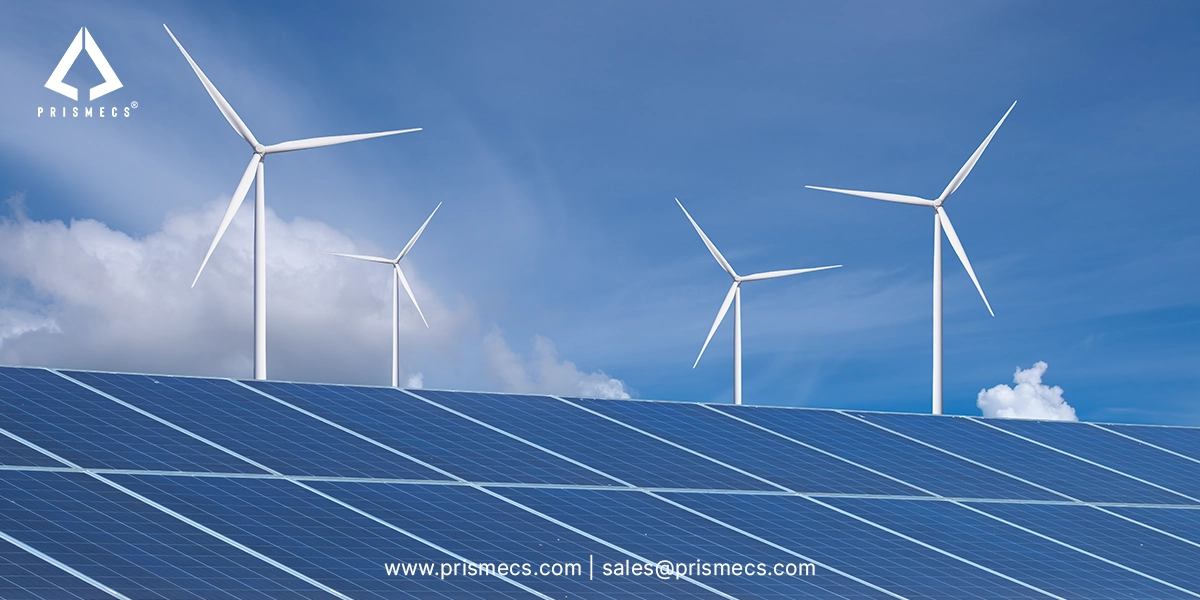
Gas turbines continue to be a cornerstone of industrial and utility-scale power generation, delivering high efficiency, operational reliability, and adaptability in an evolving energy landscape. Innovations in aero-derivative and heavy-duty turbine technologies are enabling operators to reduce emissions, optimize fuel consumption, and ensure uninterrupted power across critical infrastructure, microgrids, and distributed energy systems. Supporting these advancements, Prismecs provides tailored gas turbine solutions and EPC expertise to help operators implement these technologies effectively, maximizing uptime, sustainability, and long-term asset performance.
Key Innovations in Gas Turbine Technology
Some of the key innovations in cutting-edge gas turbine technology are discussed below.
Advancements in Efficiency
Efficiency has always been at the core of gas turbine design, and the latest developments are pushing performance boundaries. High-efficiency gas turbines are now achieving improved mechanical drive capabilities and superior aerodynamics, which reduce energy losses and improve fuel efficiency. Heavy-duty gas turbines and aero-derivative gas turbines have become state-of-the-art solutions in industries, including combined cycle power plants and aviation, where performance demands are highest, and are featured within our equipment inventory to support efficient deployment.
Advanced blade designs and sophisticated cooling techniques also reduce operational inefficiencies, contributing to lower fuel consumption, higher output, and improved performance. These innovations in efficiency are making gas turbines more cost-effective and sustainable, enabling them to meet the evolving energy demands of industrial applications.
Sustainability and Emissions Reduction
The future of gas turbines is closely tied to the industry’s push for sustainability. Environmental concerns, particularly regarding greenhouse gas emissions, are prompting turbine manufacturers to focus on developing low-emission solutions. By incorporating cutting-edge combustion technologies, such as low-emission combustion chambers and catalytic converters, modern gas turbines significantly reduce harmful NOx and CO2 emissions, making them much cleaner and more environmentally friendly.
The move towards using liquid fuel and natural gas as primary energy sources for gas turbines is also aiding in reducing the carbon footprint, as these fuels are more environmentally sustainable than coal and oil.
Hybridization and Energy Storage Integration
A growing trend in gas turbines is their integration with renewable energy sources. Combining gas turbines with wind or solar power, hybrid systems offer a stable and reliable energy supply while balancing the intermittent nature of renewable energy generation. Gas turbines can quickly respond to fluctuations in demand, providing a seamless transition between renewable and conventional power sources.
Incorporating energy storage solutions such as batteries or compressed air storage can further enhance gas turbine-based power generation's flexibility and overall efficiency. This integration allows for smoother grid management, ensuring power supply remains stable and reliable even during times of fluctuating energy production.
Digitalization and Predictive Maintenance
As part of the ongoing digital transformation in energy systems, gas turbines are now equipped with advanced sensors, data analytics, and machine learning algorithms. These technologies enable real-time monitoring of turbines, allowing operators to detect potential issues early and optimize their performance.
The integration of predictive maintenance strategies minimizes downtime, extends the lifespan of gas turbines, and increases overall operational efficiency. Digital twin technology virtual replicas of physical turbines enable thorough testing and analysis, facilitating more effective design improvements and performance optimization. This shift towards digitalization is helping gas turbines to remain adaptable and resilient in the face of evolving technological and operational challenges.
Micro Gas Turbines and Decentralized Power Generation
The miniaturization of gas turbine technology has led to the development of micro gas turbines, which offer significant advantages for decentralized power generation. These compact turbines can be employed in various applications, from data centers to remote off-grid locations. Microgas turbines provide high-efficiency, low-emission energy solutions and offer combined heat and power (CHP) generation potential, making them ideal for sustainable and resilient energy systems.
Incorporating microturbines into small businesses or remote installations provides a reliable and cost-effective solution, especially in areas where grid power supply is unreliable or unavailable. Their versatility also makes them crucial in advancing the decentralization of power generation.
Industrial & Distributed Gas Turbine Applications
Beyond conventional large-scale power plants, aero-derivative and heavy-duty gas turbines are increasingly enabling industrial, distributed, and remote energy solutions. These turbines deliver rapid-start capability, high-efficiency mechanical drive, and reliable backup power, making them ideal for microgrids, off-grid industrial sites, and critical infrastructure. By integrating with renewable energy sources and energy storage systems, gas turbines provide flexible, low-emission power that ensures operational continuity and resilience even in fluctuating demand environments. Prismecs leverages its engineering expertise to deploy these advanced turbine systems efficiently, helping operators maximize uptime, reduce lifecycle costs, and meet sustainability targets across industrial and utility sectors.
The Road Ahead: Gas Turbines and the Future of Energy
The future of gas turbines is marked by continuous innovation and expansion across multiple industries. For example, heavy-duty gas turbines used in combined cycle power plants have demonstrated significant strides in high efficiency and power-producing capabilities. As gas turbines continue to evolve, advancements in turbine design, hybridization, and digital technologies will unlock new opportunities for industrial B2B transactions and energy storage solutions.
With a growing focus on emissions reduction and sustainability, gas turbines are set to play a crucial role in transitioning to a low-carbon future. Integrating aero-derivative gas turbines with natural gas and renewable energy solutions offers exciting possibilities for combined cycle power plants to operate more efficiently while minimizing environmental impact.
In a Nutshell
The future of gas turbines is full of exciting possibilities. As industries move towards cleaner, more efficient, and sustainable energy systems, gas turbines will remain at the forefront of power generation technology. With innovations in aero-derivative gas turbines, high-efficiency designs, liquid fuel capabilities, and digital technologies, gas turbines will continue to evolve, delivering power-producing solutions across sectors from aviation to decentralized power generation.
As mechanical drive solutions, combined cycle technologies, and state-of-the-art turbine designs advance, the role of gas turbines in driving energy efficiency, sustainability, and cost-effectiveness will become more critical than ever. Embracing these innovations and prospects will lead to cleaner and more sustainable energy generation and ensure a reliable and resilient power supply for future generations.
Why should you choose Prismecs as a Reliable Gas Turbine Provider?
Choosing Prismecs as your gas turbine provider means partnering with a company prioritizing innovation, reliability, and excellence. With a proven track record in delivering high-performance solutions, we combine cutting-edge technology with tailored EPC services to meet your gas turbine projects' unique needs.
Trust Prismecs to drive your success with unmatched industry expertise and a commitment to powering your future. Contact us today to discover how we can elevate your operations. To avail of our services, call us at +1 (888) 774-7632 or email us at sales@prismecs.com.
Tags: gas turbines aero-derivative power generation Gas Turbine Technology future of gas turbines
recent posts

Power Generation
10 minutes read
How to Maximize Uptime in Power Generation Plants
Discover how Prismecs power plant maintenance helps operators prevent outages, protect revenue, and keep turbines running at peak performance. Learn h...

Renewables
8 minutes read
Opportunities in Renewable Energy Development
Explore Renewable Energy Development strategies focused on grid stability, faster deployment, and resilient power systems with Prismecs. Plan your nex...

Press Release
2 minutes read
Altaaqa Global & Prismecs Form Strategic Cooperation to Accelerate Modular Power Deployment Across USA
Prismecs and Altaaqa Global Announce Strategic Cooperation to Accelerate Modular Power Deployment in the United States Houston, TX & Dubai, UAE – Febr...

Procurement
9 minutes read
Complete Guide to Industrial Procurement Services
Explore Industrial Procurement Services for power and oil & gas projects. Cut delays, secure critical equipment, and build resilient supply chains wit...